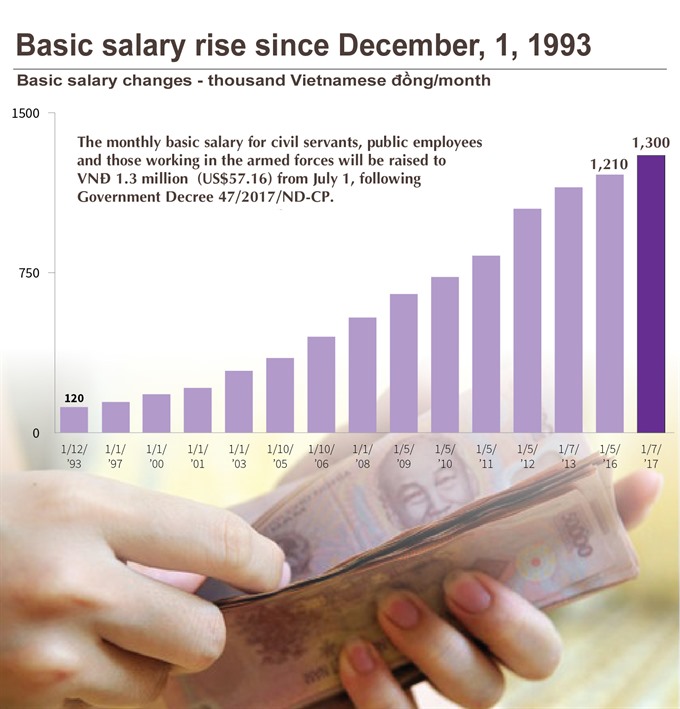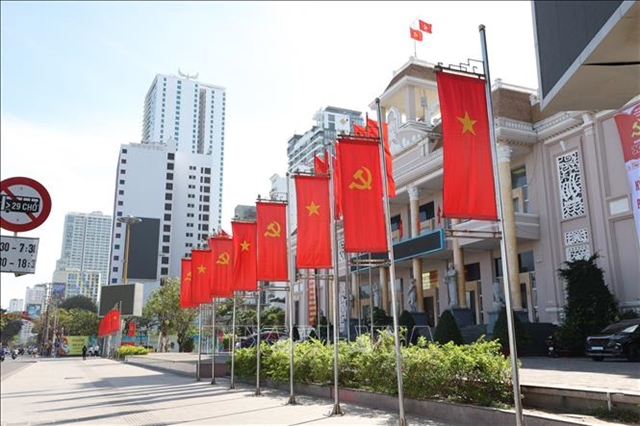 Society
Society

People, particularly those working in informal sectors and housewives, are afraid of a possible surge in the prices of goods as soon as the basic salary for civil servants and public employees increases next month.
 |
| Customers shop at a convenience store in Hà Nội. The monthly basic salary for public employees will be raised to VNĐ1.3 million (US$57.2) from July 1. — VNS Photo Đoàn Tùng |
HÀ NỘI — People, particularly those working in informal sectors and housewives, are afraid of a possible surge in the prices of goods as soon as the basic salary for civil servants and public employees increases next month.
The monthly basic salary for civil servants, public employees and those working in the armed forces will be raised to VNĐ1.3 million (US$57.2) from July 1, following the Government’s Decree 47/2017/NĐ-CP. The change means an increase of VNĐ90,000 ($3.96) over current levels.
The new basic salary will be applied to those who working in agencies, organisations and non-production units of the Party, the State, political-social organisations and associations receiving funding from the State budget, along with the armed forces.
Approximately seven million people will benefit from the salary rise. The basic level is used as the basis for calculating salary, allowances and other payments regulated by the law for the mentioned groups. It will also be used for calculating operating expenses, living expenses in line with legal regulations as well as other deductions and entitlements.
However, people who are not directly affected by the increase experience its impacts through the costs of goods. This has been noted previously, with wage rises usually accompanied by a surge in the prices of goods and services.
Nguyễn Thu Hiền, 54, a housewife in Hà Nội’s Tây Hồ District said that she was not a State employee and would not receive a salary bump, but this fact is irrelevant to the sellers at the market she frequents.
“In the past, whenever a salary rise is announced, the sellers usually push up the prices of their products, saying that as salaries rise, so does the cost of petrol and power,” she said.
“What worries me is the price of goods rising faster than wages,” she said.
Phạm Thu Nguyệt, an employee at a State agency in Hà Nội said that she had worked there for seven years.
“Theoretically, I would get additional VNĐ270,000 monthly thanks to the July salary rise,” she said, adding that she could not do much with the modest sum.
“But it is an increase. I appreciate it and I hope the salary increase will not disappear with the increased prices of daily products and services,” she said.
Experts reassure consumers
Đặng Đức Anh, director of Analysis and Forecasts Department of the National Centre for Socio-economic Information and Forecast (NCIF) under the Ministry of Planning and Investment said that the July salary increase would not have much effect on the prices of goods or the consumer price index (CPI).
“The salary rise is modest and the demand of Việt Nam’s economy is weak, thus the salary increase will not have a significant impact on CPI, but mostly on the prices of public services,” he said.
“When prices of public services increase, consumers must reduce their expenses on other products and services. The salary rise would help them better cover daily expenses,” he said.
With more money, it was expected that people would spend more and thus, increase economic growth, he said.
He reassured consumers that it was unlikely that sellers would take advantage of the salary increase to push up prices of products or services because they were facing low demand and tough competition.
“If they offer higher-priced products, they may lose customers,” he said.
Economist Đinh Thế Hiển said that the scheme for salary increases for civil servants and public employees should be sped up because current salaries did not match their workloads.
Another economist Nguyễn Minh Phong said that now was a reasonable time for a salary increase.
Previously, salary increases usually led to hiked prices of necessities because the country faced modest supply.
However, the supply of goods and services was much more abundant, so it was not necessary to worry about increased prices of goods and services following a rise, Phong said. — VNS
 |
| VNA Infographic |




